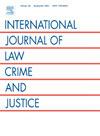信仰与正义在行动:了解泰国中部佛教寺庙在公民缓刑中的作用
IF 1.4
4区 社会学
Q3 CRIMINOLOGY & PENOLOGY
International Journal of Law Crime and Justice
Pub Date : 2025-07-03
DOI:10.1016/j.ijlcj.2025.100768
引用次数: 0
摘要
本研究考察泰国中部佛教寺庙作为公民缓刑中心的功能,运用布迪厄的理论框架分析其康复实践。通过对城市和农村寺庙进行定性研究,涉及29名参与者(缓刑官、志愿者、僧侣和缓刑犯)。研究发现了三个关键发现:首先,寺庙创造了混合领域,不同形式的资本通过将正式监督与精神指导结合起来,通过重新配置刑罚权威,促进了康复。其次,佛教冥想练习和伦理教导作为替代的康复资源,为行为改变提供“超然的道德锚”,解决问题行为背后的内在模式,而不仅仅是外部顺从。第三,职业培训和社区融合活动代表资本转换,其中寺庙的社会资本有助于获得合法的经济机会,同时通过重新融入社区减少耻辱。寺庙的文化权威增强了康复的合法性,同时创造了“道德场所”,在那里监督从官僚服从过渡到道德重新整合。尽管城市和农村环境之间存在资源差异,宗教和官僚方法之间存在紧张关系,但基于寺庙的模式表明,文化机构如何有效地支持司法目标,同时解决传统缓刑的局限性。这项研究有助于理解文化嵌入的康复方法,并为开发利用现有社区机构来提高康复效果的缓刑系统提供见解。本文章由计算机程序翻译,如有差异,请以英文原文为准。
Faith and justice in action: Understanding the Buddhist temple's function in civic probation in Central Thailand
This study examines how Buddhist temples function as civic probation centers in Central Thailand, utilizing Bourdieu's theoretical framework to analyze their rehabilitation practices. Through qualitative research at urban and rural temple sites involving 29 participants (probation officers, volunteers, monks, and probationers). Three key findings were identified: First, temples create hybrid fields where different forms of capital facilitate rehabilitation by reconfiguring penal authority through combining formal oversight with spiritual guidance. Second, Buddhist meditation practices and ethical teachings serve as alternative rehabilitation resources, providing “transcendent moral anchors” for behavioral change that address internal patterns underlying problematic behaviors rather than external compliance alone. Third, vocational training and community integration activities represent capital conversion, wherein temples' social capital facilitates access to legitimate economic opportunities while reducing stigma through community reintegration. The temples' cultural authority enhances rehabilitation legitimacy while creating “moral locales” where supervision transitions from bureaucratic compliance to moral reintegration. Despite resource disparities between urban and rural settings and tensions between religious and bureaucratic approaches, the temple-based model demonstrates how cultural institutions effectively support judicial objectives while addressing limitations in conventional probation. This research contributes to understanding culturally embedded rehabilitation approaches and offers insights for developing probation systems that leverage existing community institutions to enhance rehabilitation outcomes.
求助全文
通过发布文献求助,成功后即可免费获取论文全文。
去求助
来源期刊
CiteScore
2.70
自引率
0.00%
发文量
25
审稿时长
47 days
期刊介绍:
The International Journal of Law, Crime and Justice is an international and fully peer reviewed journal which welcomes high quality, theoretically informed papers on a wide range of fields linked to criminological research and analysis. It invites submissions relating to: Studies of crime and interpretations of forms and dimensions of criminality; Analyses of criminological debates and contested theoretical frameworks of criminological analysis; Research and analysis of criminal justice and penal policy and practices; Research and analysis of policing policies and policing forms and practices. We particularly welcome submissions relating to more recent and emerging areas of criminological enquiry including cyber-enabled crime, fraud-related crime, terrorism and hate crime.

 求助内容:
求助内容: 应助结果提醒方式:
应助结果提醒方式:


